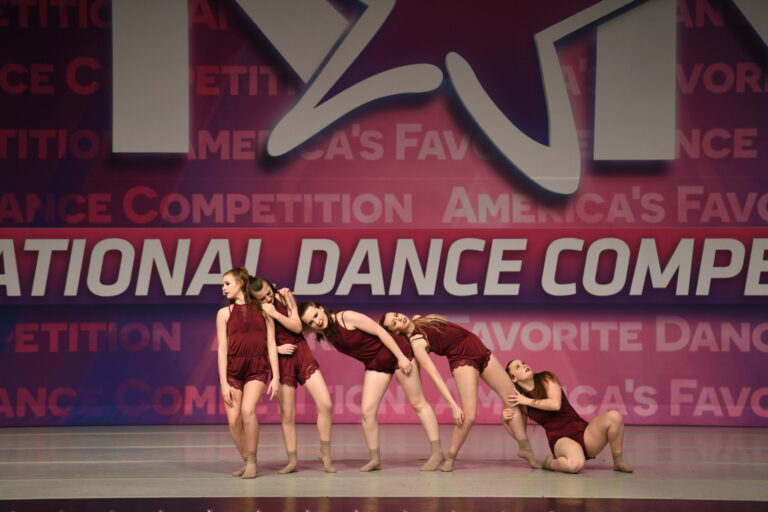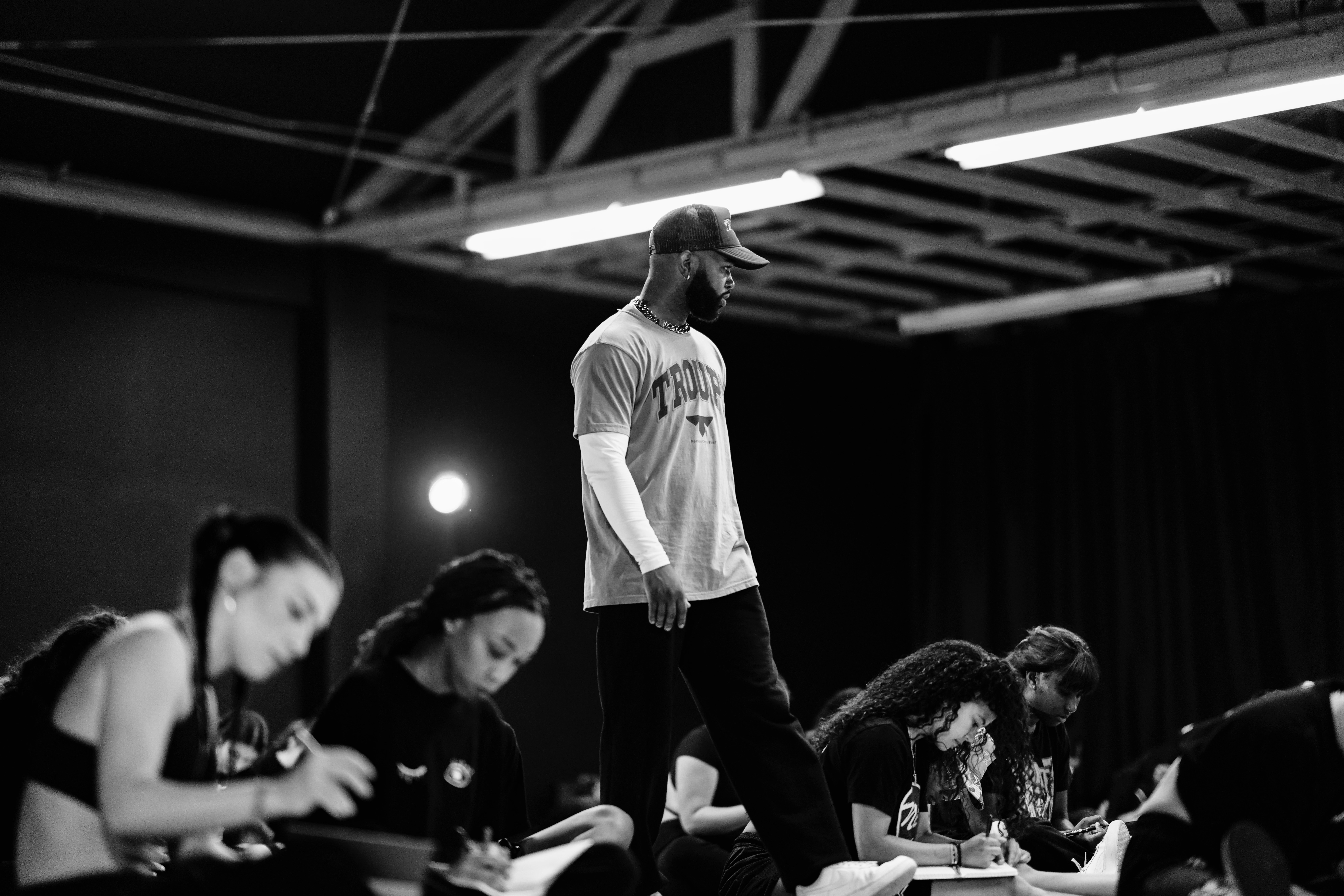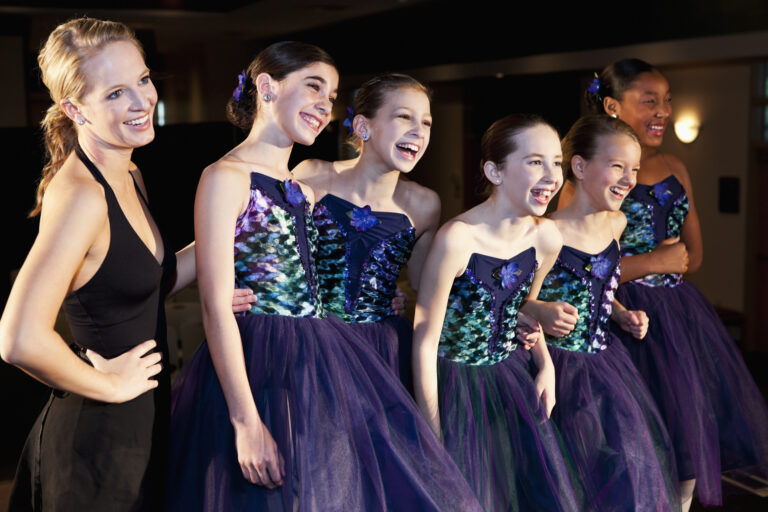Elizabeth Parkinson and Scott Wise momentarily consider the most challenging part of leaving behind their Tony and Astaire Award–winning performance careers. Now full-time teachers at their school FineLine Theatre Arts, the married couple look into each other’s eyes and simultaneously reply, “Three-year-olds!”
Wise: “Those three-year-olds don’t care who you think you are.”
Parkinson: “It’s terrifying.”
Wise: “And you know you’re setting a precedent for dance for them . . .”
Parkinson: “For their whole lives!”
Considered two of their generation’s most talented and versatile performers, the couple embarked on their new lives in October 2006 when they opened a two-floor music and dance school in New Milford, Connecticut. They went from performing eight times a week in shows like Jerome Robbins’ Broadway and Fosse, to teaching 14 to 20 classes weekly. They raise their 5-year-old son James Montana Wise. They manage their school’s finances and marketing. They oversee 10 teachers and direct three student ensembles. It’s far from Broadway.
“Some achieving dancers don’t have the ability to come down from that illusionary pedestal and be able to communicate with kids,” says Emanuel Azenberg, 41-time Tony Award–winning producer, who worked with the couple on Twyla Tharp’s Movin’ Out and who gave them a private loan to begin FineLine. “The school,” says Azenberg, “is as productive work as when they were performing. In many respects it’s better.”
The couple’s day at FineLine begins at 8:45 am, after delivering their son to school. It often ends around 9 pm, after teaching three classes and running rehearsals. Parkinson and Wise rarely work in the same room. Wise teaches acrobatics, musical theater and tap, while Parkinson teaches ballet, modern and jazz. Despite the economic downturn, they attribute their school’s growing success to their different training backgrounds and styles. Several of their students are working professionally in companies like MOMIX and shows like Billy Elliot.
Given Wise’s natural stage prowess, it’s remarkable that his teaching style is so patient. “Scott,” says Parkinson, “performs with an intensity that borders on frightening. Absolute joy and absolute anger are easy for him to reach.” Born in Pocatello, Idaho, Wise studied, he says, “at every Dolly Dinkle school imaginable. Every one of my teachers taught me something about performance.” But it was his mother who helped him the most. Despite the fact that dance performance was considered unmanly, he says, “She wanted me to have something special to call my own.” In his 20s Wise moved east to study ballet (after excelling in gymnastics), but he never lost his western style. (It’s the opposite of arrogant, with energy to burn, according to Azenberg.)
Like her husband, Parkinson isn’t one to put on airs. She stunned her fellow Joffrey Ballet dancers when she left her principal position there to perform with smaller companies (Eliot Feld and Donald Byrd) and to work on the opposite side of the tracks—Broadway. She didn’t take a conventional training route either. At age 9, growing up in Tampa, Florida, she tried ballet and didn’t think much of it. She returned to it at 13 years old and never stopped, bucking the perception that if a ballet dancer doesn’t begin training before she reaches puberty, she will never turn pro. “I really see how your experiences shape how you are as a teacher,” says Parkinson, who encourages her students to study acting and to find their passion—whatever it is.
Despite performing in the same shows, the couple has never danced together onstage. Remembering his first glimpse of Parkinson in Fosse rehearsals, Wise recalls, “She was sitting on the floor putting on her ballet shoes for jazz class,” and “She was wearing an old raggedy knit unitard.” But watching her dance, he saw beyond the clothes: “Elizabeth’s dancing is beautifully unabashed.” They married in 1999. Upon leaving Movin’ Out in 2005, they began discussing the possibility of opening a school. Opportunity knocked when they learned that Arlene Begelman’s three-decade-old School of the Performing Arts would be closing. They inherited half of her faculty and many students, but they wanted the space to be their own. Using their savings to gut a former beauty salon on Railroad Street and a $4,000 grant from Career Transitions For Dancers to install floors, they transported (78 miles northeast) their Broadway work ethos:
Wise: “Treat everyone nicely.”
Parkinson: “It will come back to you.”
Wise: “Otherwise it will slap you right across the face!”
One mid-October afternoon in Studio A, Parkinson begins her class by asking her level III/IV ballet students to set an intention for themselves. She is teaching them to structure an emotional and intellectual approach to their work. She demonstrates fouetté turns full-out. Her blue eyes reveal her gravitas, but she is no ballet doyenne. She sports red hot-pants. Tellingly, all of her students are in short shorts, too, testifying to their desire to emulate her.
Meanwhile, in studio B, Wise triumphantly jams his fists in the air after watching the 25-student opening scene of the school’s alternative Nutcracker. It features a motley group of modern kids romping through the holiday tradition by singing and dancing. Wise loves to cut up with his students. “He’s a giant teenage boy, but the best kind,” says student Rosie Kahan. His class, however, never gets rowdy.
Broadway colleague and fellow FineLine teacher Mary Ann Lamb says, “Scott prepares kids for what the performing arts world demands of them.” Besides talented, they must be focused, good-natured and flexible. Wise mastered all three traits early on, but in 1989, after winning a Tony for best featured actor in Jerome Robbins’ Broadway, he had to learn them all over again because of the theater world’s turbulent economy. “I couldn’t get a job,” Wise says. His agent found him a minimum paying chorus part in Guys and Dolls. “The experience was a blessing,” he says, because each night the performances of character actors Nathan Lane and Faith Prince mesmerized him. They reinforced his love of the acting community, which makes magic while making do.
Do they miss performing? Parkinson says that she recently turned down an invitation from choreographer Benjamin Millepied to go to France. “ I do get these offers all the time. I weigh the things and I graciously decline,” she says. She doesn’t kid herself that she could simultaneously give her best to her students, her child and the stage. “You can’t do it all. For us to have a school,” says Parkinson, whose commitment to her students borders on the devout, “we need to really love it.” Wise wholeheartedly agrees: “It’s amazing how close you get to the kids.” DT
Rachel Straus is a PhD candidate in dance history, takes ballet class with Zvi Gotheiner and is working on a subway dance film with Kurt Ritta.
Photos by Joan Marcus, courtesy of The Publicity Office


